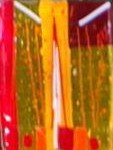Why We Do the Things We Do
 There’s a moment in a new bestseller when if the protagonist drives west he’ll be safe and can begin a new life, and if he returns east, he’ll face life-threatening escapades. East he goes, despite its known dangers. We all do a lot of that.
There’s a moment in a new bestseller when if the protagonist drives west he’ll be safe and can begin a new life, and if he returns east, he’ll face life-threatening escapades. East he goes, despite its known dangers. We all do a lot of that.
Many times, we make cosmic u-turns when facing the unknown, That’s everything from regaining lost weight to felons returning to jail. Why? What’s the need for what I call YoYo lessons?
Most of us are familiar with the Golden Calf story (rent the old Charlton Heston film for great imagery): Moses atop Sinai for forty days, getting the ten commandment tablets. Everyone else down below, getting restive, and just a day before he returns, smelting their gold to make the idol they’ve been told never to worship. Moses descends, sees it, and smashes the tablets.
We’re being asked to do what we don’t have a strong legacy of doing: trusting. Our leader seems to be on break. Don’t we get one too? Just one day off or coupla brownies, a chance to cut ourselves some slack. Permission to slide into the old ways. Permission, permission, permission. Danger, danger, danger.
There’s a great passage in a book called The Genizah at the House of Sepher: The Hebrew language is like my father: elegant, logical, concise. A word begins from a root, a mere three letters, and grows like a plant through seven constructs: I break; I smash; I am broken; I am smashed; I make shatter; I am caused to break down; I devastate myself.
That’s the contradiction and mandate of our lives. The tablets smashed because of our impatience. Now it’s our job to collect the holy motes of dust still swirling. That we breathe in and out every day. To build the ark from them and from within ourselves. To rebuild our broken, shattered world. To heal it and ourselves.
Like the holy sparks in each of us, remnants of those tablets, the Big Bang, or echoes of whatever cosmology you choose to embrace, to do our job on earth. In sage Joni Mitchell’s great words: We are stardust. We are golden. And we’ve got to get ourselves back to the garden.
Along the way we screw up, we fall down, we fall apart, we smash, and we are smashed. We eat the chocolate, build the calf, or find some new way to screw up. And in the thirteen attributes of the divine, also in this reading, we are forgiven. We get another chance to try again. To get it right. To build a holy altar this time.
Rabbi Shefa Gold says: Sometimes, when I think I’m building a altar, it’s really a golden calf. I’d like to think the converse is also true, that even a Golden Calf could transform into an altar with the right remorse and intention. Though I’ve been accused of wishful thinking and denial, I’d think we get credit for showing up, for sincere intention, for trying, and for trying again. What else would we do with our time here?
Exercise: Spend some time this week thinking about your biggest mistakes, what you’ve learned about how to avoid repeating them, healing, and about how this informs your life now.